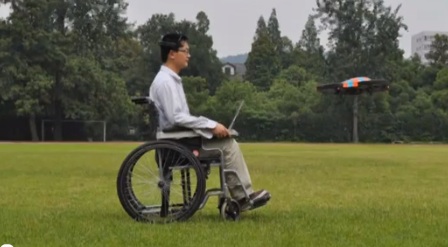DIY Drones: The Future is Now

What’s the Big Idea?
“Hacking the physical” is how Dale Dougherty described the burgeoning DIY Drone movement to Peter Daimandis in his book Abundance: The Future is Better Than You Think. Dougherty, the founder and publisher of Make magazine, was describing the broad trend that has enabled individuals to construct homebrew versions of sophisticated machines at a fraction of the cost. In the case of unmanned air vehicles (or UAVs), 90 percent of the functionality of a military drone was accomplished for just 1 percent of the military’s price.
This rapid cost reduction, or demonitization, has led to breathtaking innovation in this field, and UAV advocates see the FAA issuing personal and commercial licenses by 2015. Imagine what the aerospace industry will look like in three years if amateurs continue to beat the dinosaurs at their own game. The sky will be filled with UAVs, and people who had previously been cut off from the global transportation network will have access to vital supplies and materials. Two recent developments suggest this isn’t just the stuff of fantasy.
What’s the Latest Development?
Jerry LeMeiux, a retired colonel with an engineering PhD and “10,000 hours of aviation experience,” has just launched the so-called Unmanned Vehicle University. While there are currently no FAA-issued requirements for personal or commercial drone operators, LeMeiux is getting a head start by offering a broad unmanned vehicle education.
Here is a sample of LeMeiux’s course that is available on Youtube:
We also recently learned that Chinese researchers had developed a brain-operated drone for the purpose of aiding disabled people. If you watch the video below, it is not difficult to see other possible uses for this technology.
Watch the video here:
While some see the proliferation of drones leading to a dystopian future of swarms of cyborg insect drones, these recent developments show us an industry that is maturing, and which offers clear benefits to humanity. That does not mean that civilian and commercial drones will not need to be regulated in the future. Our already overcrowded airspace could get very crowded indeed. It’s time for the FAA to get to work!
Image courtesy of Shutterstock
Follow Daniel Honan on Twitter @Daniel Honan





